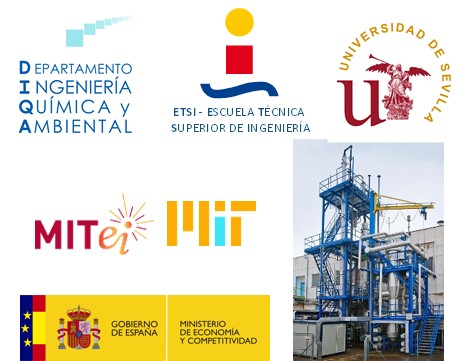
CLIMATE CHANGE MITIGATION: MAKING PROGRESS IN CHALLENGING TIMES May 4, 2016 DIQA – University of Sevilla (Seville – Spain)
Energy demand grows every day. With the global population set to rise from 7 to 9 billion by 2050, and the rapidly industrialization of developing countries such as China or India, world energy demand is expected to significantly increase over the next decades. The utilization of fossil fuel to meet high-energy demands entails large emissions of CO2 if new policy measurements are not taken. The solution to achieve CO2 emission reduction targets is a combination of energy efficiency, renewable energy and Carbon Capture and Storage (CCS) technologies.
Carbon Capture is technically feasible nowadays, but there are still critical challenges for the purpose of mitigating high volume CO2 emissions: 1) reducing technology cost; and 2) operating at large scale. Strategies being followed include the development of new and improved solvents, new processes to facilitate capture while reducing cost such as partial oxycombustion, and the investigation on novel materials.
During this workshop, we will examine some of the recent milestones achieved in the CCS community, with emphasis in Carbon Capture technology in Europe and USA, as well as scrutinize some of the challenges ahead.
- Venue: Escuela Superior de Ingenieros – University of Sevilla (Seville – Spain)
- Date: May 4, 5, 2016
Includes tour to ETSI/DIQA R&D facilities
- Invited Speakers:
Howard Herzog – MIT Energy Initiative (USA)
Magdalena Strachinescu Olteanu – DGENERGY, European Commission
John Gale – IEA GHG (UK)
Javier Alonso Martínez – PTECO2 (Spain)
Samantha McCulloch – IEA / CCS unit (France)
Alberto Abánades – MINECO
Vicente Cortes – INERCO (Spain)
- Attendees: R&D int’l centers, R&D Departments – companies, European projects, universities, CO2 Platforms
- Dedicated sessions on current CCS research status will be held on May 5, from 9am to 5pm:
Aimaro Sanna. CICCS. Solid sorbents for CO2 capture applications
Fernando Vega. ETSI. Partial oxy-combustion
Nelia Jurado. Cranfield University. Simulation of power generation process based on oxy-combustion technology.
Luis Miguel Romeo. University of Zaragoza. Second generation of oxy-combustion technology. O2Gen Project.
- There is no registration fee for the meeting.
To register for the workshop, please download the registration form linked below and send it by e-mail to diqa@us.es as you fill it in. You should indicate ‘APPLICATION FOR CARBON CAPTURE AND STORAGE WORKSHOP‘ in the e-mail subject. To assist in our planning, we request that you register as early as possible.
Deadline for the registration by May, 3rd
Professional Registration Form
We look forward to seeing you at the workshop.
